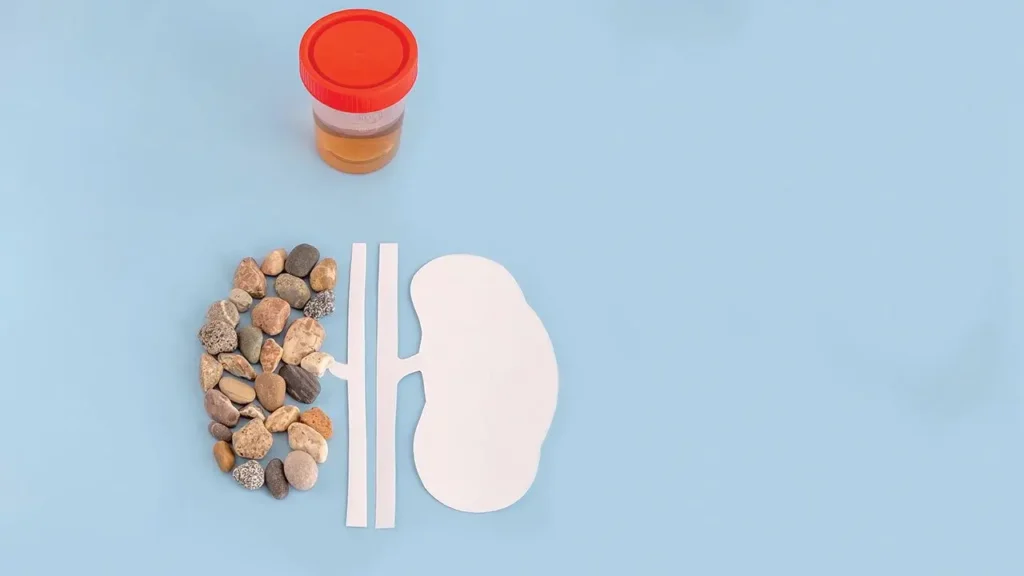Kidney stones or renal calculi or nephrolithiasis or urolithiasis is the solid mass of crystals made up of minerals and salts and can affect the urinary tract. They do not cause any damage if they are recognized early but a delay can result in complications. These stones formed inside the kidney are made of various components. Let’s discuss it!!
Various types of stones:-
- Calcium stone:- Mostly made of calcium oxalate but also of calcium phosphate or maleate. Oxalate is made by your liver or absorbed from your diet. Some fruits and vegetables, nuts and chocolate, have high oxalate content. Reducing oxalate-rich foods such as potato chips, peanuts, chocolate, spinach, etc. High milk content and high doses of vitamin D, can also increase the concentration of calcium or oxalate in urine. However, getting enough calcium in your diet can prevent stones from forming also.
- Uric acid:- It is the second most common kidney stone. It usually occurs in patients with gout, diabetes, obesity, and other types of metabolic syndrome. Uric acid stones can form in people who lose too much fluid and who eat a high-protein diet.Certain genetic factors also play a role in forming uric acid stone
- Struvite:- This type of stone is found in people with urinary tract infections (UTIs), which cause urinary obstruction. They grow quickly and become quite large. It results from a kidney infection.
- Cystine:- About 1 in 7,000 people get cystine kidney stones. They occur in both men and women, hereditary disorder cystinuria. Cystine is an acid found naturally in the body.
Risk factors of kidney stones:-
There is no specific cause of kidney stones, although several factors may increase your risk:-
- Mostly occurs between the ages of 20 to 35
- More chances of males being affected than females.
Other risk factors include:
- Dehydration
- Obesity
- High levels of protein, salt, or glucose diet
- Hyperparathyroid condition
- Gastric surgery
- Inflammatory bowel diseases that increase calcium absorption
Symptoms of kidney stones:-
It will cause no severe symptoms until the stone does not move to the ureter. If a kidney stone is lodged in the ureters, it will block the flow of urine which causes the kidney to swell and the ureter to spasm. This condition causes severe pain in the back and abdomen and may radiate to the groin area, making the patient restless. Other symptoms include:-
- blood in the urine ( could be red, pink, or brown urine)
- vomiting
- nausea
- discolored urine
- foul-smelling urine
- chills
- fever
- frequent urination
- Dribbling urine
Tests and diagnosis of kidney stone:–
Diagnosis of kidney stones involves complete health history and a physical examination and some other tests include:-
- Blood tests for calcium and uric acid.
- Blood urea nitrogen (BUN)and creatinine test for crystals, bacteria, blood, and white cells.
- Examination of passed stones
- Abdominal X-rays
- Ultrasound of the kidney
- MRI scan
- Abdominal CT scan
Treatment of kidney stones:-
The treatment for kidney stones depends on the size of the stone, it is too large and blocks urinary symptoms, the doctor will follow the procedure:-
- Shock-wave lithotripsy is a noninvasive procedure that blasts the stones into fragments with a high-energy sound wave. These fragments of stones passed out in the urine.
- Ureteroscopy:- an endoscope is inserted through the ureter to retrieve the stone.
- Percutaneous nephrolithotomy:- For large and complicated stones. It is very rarely used.
Prevention of kidney stones:-
- Proper hydration:- drink enough fluid to pass at least 2.5 liters of urine each day, which helps flush the kidneys.
- Citrate juices:- lemon-lime soda and fruit juice could help prevent the formation of stones.
- Oxalate-rich foods in moderation:- reducing your intake of salt and animal proteins, reduces the risk of kidney stones.
The right information is your guide to good health.

